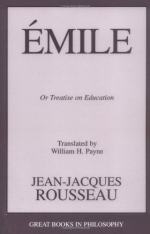
|
| Name: _________________________ | Period: ___________________ |
This test consists of 15 multiple choice questions and 5 short answer questions.
Multiple Choice Questions
1. Which student does Rousseau say will learn quickest?
(a) The student motivated by the threat of parental judgment.
(b) The student motivated by selfishness.
(c) The student motivated by competition with fellow students.
(d) The student motivated by desire to know.
2. What does Rousseau explicate regarding selfishness?
(a) How it is created by teachers.
(b) How it is sown by passions.
(c) How it is falling into laziness.
(d) How it emerges naturally.
3. What argument does Rousseau use to support his emphasis on the need for physical activity in children?
(a) He cites philosophers who agree with him.
(b) He refutes philosophers' claims to the contrary.
(c) He appeals to the reader's common sense.
(d) He refers to studies that have been conducted.
4. What is the ultimate goal of Rousseau's educational philosophy?
(a) A student who can quote scripture for anything that happens, no matter how rare or unusual.
(b) A student who can discern the difference between not knowing and ineffective grasps at knowledge.
(c) A student who acts as a repository for facts and theories for the benefit of the society around him.
(d) A student who can observe the laws of the government and of the church.
5. Which philosopher was Rousseau strongly influenced by?
(a) John Stuart Mill.
(b) Seneca.
(c) Plotinus.
(d) John Locke.
6. What kind of mother does Rousseau address himself to?
(a) Mothers who follow the rules.
(b) Mothers who believe in God.
(c) Mothers who have traditions.
(d) Mothers who think for themselves.
7. How does Rousseau suggest telling students about where babies come from?
(a) Say that they come from the fertilization of an egg by a man's sperm.
(b) Say that they come from a stork, or another mythic beast.
(c) Say that they come from God.
(d) Say that they come from woman's body, with difficulty for the woman.
8. How old was Rousseau when he wrote "Emile"?
(a) In his 50s.
(b) In his 60s.
(c) In his 40s.
(d) In his 30s.
9. Rousseau contrasts book learning with what kind of learning?
(a) Learning from competition.
(b) Learning from watching.
(c) Hands-on learning.
(d) Learning from dictation.
10. What example does Rousseau use for teaching Emile to read?
(a) The tutor told Emile that he would be rewarded if he learned to read.
(b) The tutor threatened to humiliate Emile if he did not know his letters.
(c) The tutor cajoled Emile with praise and gifts.
(d) The tutor left notes around for Emile and Emile wanted to read them.
11. What does Rousseau say changes the effects of women on young men?
(a) Violent rages.
(b) Love poetry.
(c) Existential despair.
(d) Hormonal flushes.
12. Where does Rousseau say self-love is rooted?
(a) In excessive desire.
(b) In self-awareness and natural affection.
(c) In fear of the world.
(d) In stifling education.
13. How was Rousseau rewarded for writing "Emile"?
(a) With money and reputation.
(b) With entitlements and privileges.
(c) With public holidays.
(d) With land and secured income.
14. How did the man to whom Rousseau was apprenticed treat Rousseau?
(a) Gently.
(b) Violently.
(c) Dispassionately.
(d) Affectionately.
15. In what does Rousseau say selfishness is rooted?
(a) Competition between facets of the self.
(b) Nostalgia for a prelapsarian state.
(c) Comparison of the self with others.
(d) Resentment of childhood sexual trauma.
Short Answer Questions
1. Why does Rousseau say that children lack strength?
2. What does Rousseau say is the source of inner conflict?
3. What does Rousseau say children are working within as they attain their strength?
4. What kind of strength does Rousseau say adolescents attain?
5. What is it that allows an adolescent to exceed his limits?
|
This section contains 682 words (approx. 3 pages at 300 words per page) |

|




